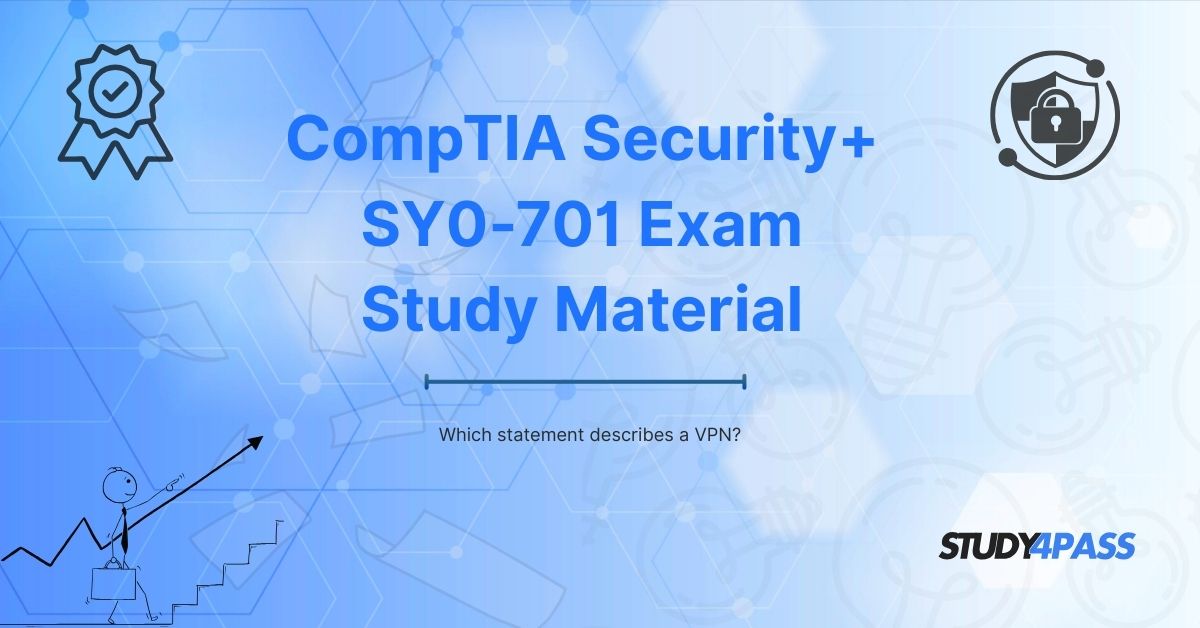Introduction
In today's digital landscape, securing online communications is more critical than ever. Virtual Private Networks (VPNs) play a vital role in ensuring data privacy, security, and anonymity. For IT professionals preparing for the CompTIA Security+ (SY0-701) exam, understanding VPNs is essential. This article explores which statement describes a VPN, its types, benefits, and relevance to the Security+ certification. Additionally, we’ll discuss how Study4Pass can help you ace your exam with high-quality study materials.
What is a VPN?
A Virtual Private Network (VPN) is a technology that creates a secure, encrypted connection over a less secure network, such as the internet. It allows users to transmit data as if their devices were directly connected to a private network, even when accessing resources remotely.
Key Characteristics of a VPN:
- Encryption: VPNs use encryption protocols (e.g., AES, IPsec, SSL/TLS) to protect data from eavesdropping.
- Tunneling: Data packets are encapsulated within another protocol to ensure secure transmission.
- Authentication: Users must authenticate before accessing the VPN, ensuring only authorized individuals can connect.
- Anonymity & Privacy: VPNs mask the user’s IP address, making online activities more private.
Which Statement Describes a VPN?
When studying for the CompTIA Security+ (SY0-701) exam, you may encounter questions like:
"Which of the following best describes a VPN?"
Possible answers could include:
- A) A network that uses public cables to connect remote users.
- B) A secure, encrypted connection over a public network.
- C) A physical device that filters malicious traffic.
- D) A protocol used for email encryption.
The correct answer is B: A secure, encrypted connection over a public network.
This definition aligns with the core function of a VPN—providing a private, encrypted tunnel over an otherwise insecure network like the internet.
Types of VPNs
Understanding different VPN types is crucial for the SY0-701 exam. The main categories include:
1. Remote Access VPN
- Allows individual users to connect securely to a corporate network from remote locations.
- Commonly used by employees working from home.
- Examples: SSL VPN, IPsec VPN.
2. Site-to-Site VPN
- Connects entire networks (e.g., branch offices) over the internet.
- Uses routers or VPN gateways to establish encrypted links.
- Examples: IPsec tunnels, MPLS-based VPNs.
3. Client-to-Site VPN
- A type of remote access VPN where a user connects to a private network via a VPN client.
- Often used for secure access to cloud services.
4. SSL/TLS VPN
- Uses web browsers for secure access without requiring dedicated VPN software.
- Popular for remote work scenarios.
Why VPNs Matter in CompTIA Security+ (SY0-701)?
The CompTIA Security+ exam (SY0-701) tests your knowledge of network security, including VPN technologies. Key topics include:
1. VPN Protocols
- IPsec (Internet Protocol Security): Provides encryption and authentication at the network layer.
- SSL/TLS VPNs: Secure application-layer communications (e.g., HTTPS).
- WireGuard: A modern, lightweight VPN protocol gaining popularity.
- PPTP (Outdated): Older protocol with known vulnerabilities (not recommended).
2. VPN Security Considerations
- Split Tunneling: Allows some traffic to bypass the VPN (can be a security risk).
- Always-On VPN: Ensures the device is always connected to the VPN.
- VPN Logging Policies: Some VPN providers keep logs, affecting privacy.
3. VPN Use Cases in Security+
- Secure Remote Work: Employees accessing corporate resources safely.
- Bypassing Geo-Restrictions: Accessing region-locked content securely.
- Preventing Man-in-the-Middle (MITM) Attacks: Encryption prevents eavesdropping.
Study4Pass: Your Ultimate CompTIA Security+ (SY0-701) Study Partner
Preparing for the CompTIA Security+ exam requires reliable study materials. Study4Pass offers:
- Comprehensive Study Guides – Covering all SY0-701 objectives, including VPNs.
- Practice Exams – Simulating real test scenarios to boost confidence.
- Interactive Labs – Hands-on VPN configuration exercises.
- Up-to-Date Content – Aligned with the latest CompTIA exam standards.
By using Study4Pass, you gain access to structured learning resources that simplify complex topics like VPNs, ensuring exam success.
Conclusion
A VPN is a critical security tool that provides encrypted, private communication over public networks. For CompTIA Security+ (SY0-701) candidates, mastering VPN concepts is essential. Whether it's understanding different VPN types, protocols, or security implications, a solid grasp of VPNs will help you pass the exam.
Leverage Study4Pass for top-notch study materials, practice tests, and expert guidance to ace your Security+ certification effortlessly.
Final Answer to "Which Statement Describes a VPN?"
A VPN is a secure, encrypted connection established over a public network, ensuring privacy and data protection.
Start your CompTIA Security+ (SY0-701) journey today with Study4Pass and achieve certification success!
Special Discount: Offer Valid For Limited Time “Updated SY0-701 Exam Material”
Actual Exam Questions For CompTIA's SY0-701 Certification
Sample Questions For CompTIA SY0-701 Practice Test
1. What is the primary purpose of a VPN?
A) To increase internet speed
B) To encrypt internet traffic and provide secure remote access
C) To block all incoming network connections
D) To replace antivirus software
2. How does a VPN enhance online privacy?
A) By deleting browsing history automatically
B) By masking the user's IP address and encrypting data
C) By preventing all forms of online tracking
D) By increasing download speeds
3. Which of the following is a key feature of a VPN?
A) It allows access to geo-restricted content
B) It physically secures your device
C) It replaces the need for a firewall
D) It automatically updates software
4. When using a VPN, what happens to your data?
A) It is sent in plain text for faster transmission
B) It is encrypted and routed through a secure server
C) It is stored permanently on the VPN provider's server
D) It becomes invisible to all websites
5. Which scenario best illustrates the use of a VPN?
A) A gamer using a high-speed connection for lower latency
B) A remote worker securely accessing company files over public Wi-Fi
C) A student downloading free software without restrictions
D) A business disabling all firewalls for easier access


